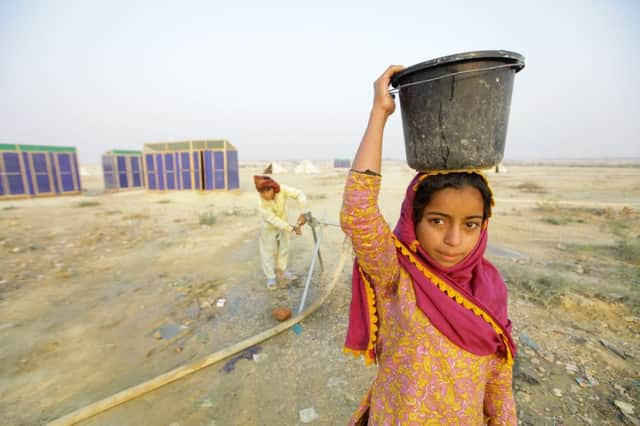Changing climate hits poor hardest


Glasgow Caledonian University (CGU) is home to the Centre for Climate Justice, a new research centre launched at the university’s Glasgow campus earlier this week.
The centre brings together a dedicated and highly knowledgeable team of researchers and academics at GCU with a wide range of specialisms within the climate justice field. I’ve worked on these issues for 20 years, leading local teams of researchers in sub-Saharan Africa and South Asia, whose contributions to “in-the-field” research projects have been invaluable.
Advertisement
Hide AdAdvertisement
Hide AdThe UN Intergovernmental Panel on Climate Change’s latest report, Climate Change 2014: Mitigation of Climate Change, said that global greenhouse gas emissions are continuing to rise at an accelerated pace and requested urgent action from world governments to limit the increase in global mean temperature to 2C.
But even if that goal is achieved, the climate change we are already experiencing will have an effect on communities across the globe. With the increasing likelihood of extreme weather events, such as flooding and droughts, simple things such as food production or maintaining adequate shelter become more difficult, especially in areas of the developing world where these tasks can already be hugely challenging, particularly for the poorest and most vulnerable.
In the developed world too, increasingly erratic weather patterns such as heavy and prolonged rainfall can ruin lives and livelihoods, and the issues around fuel poverty leave some exposed to cold weather, resulting in poor health and wellbeing.
This is why the centre’s researchers, along with colleagues in private, government and voluntary sectors, view climate change as an ethical issue: we are considering how its causes and effects relate to concepts of social and equity justice and environmental justice.
One of the key points is that those least responsible for climate change, most often the poor in the developing world, often experience the greatest impact, as they are the most vulnerable to extreme weather events such as flooding or drought limiting access to food, shelter and other basic essentials. Those living in developed countries, who have contributed the most to climate change, enjoy greater protection.
In partnership with the Mary Robinson Foundation – Climate Justice, GCU is taking a lead in research, education and advocacy on the struggle to secure global justice for those people most vulnerable to the effects and impacts of climate change.
Much of our work focuses on women and girls because of the key role they play in helping their families deal with the impacts of climate change, and their wider influence in shaping household decision-making.
The Centre for Climate Justice is working to establish knowledge, evidence, information and insight on climate justice issues at both an international and UK level. This focus is especially important in the run-up to the United Nations Framework Convention on Climate Change negotiations in 2015 and in considering implications for future UK policy and action.
Advertisement
Hide AdAdvertisement
Hide AdThe centre has expertise in adaptation, mitigation, climate justice, human rights, equitable low carbon development, social equity and justice, health and poverty, gender and poverty targeting.
The centre’s backbone is the GCU Climate Justice Repository, which contains a collection of researched data within the field. A global first, the repository provides a unique, reliable source of robust, scientifically sound and peer-reviewed materials on the socio-economic effects and human-centred implications of climate change free from political bias.
It holds more than 1,000 papers on topics including adaptation, agriculture, climate change mitigation, climate justice “movement”, economics, ethical and philosophical approaches, food security, gender, health, human rights, legal perspectives and low-carbon technology.
Dr Mary Robinson, the first woman president of Ireland, and former United Nations High Commissioner for Human Rights, who has set up a foundation to campaign on climate change issues, said the repository helps “meet the need for reliable information on the complex issues arising from climate change” and meets the requirement for “an ethical approach to its impact on the developing world”.
The centre is also working with the Joseph Rowntree Foundation and the Mary Robinson Foundation to run a series of seminars which will explore climate justice issues, the existing evidence base and the agenda for action. The first was held at GCU in May, with two more to follow in June and September.
The purpose of these dialogues is to establish a credible body of evidence: knowledge, information and insight on climate justice issues at both a UK and international level.
As the centre develops, we will continue to work with partners, both in Scotland and overseas, to identify and conduct the research, advocacy and education work most likely to benefit the lives of those who have little choice but to deal with the worst effects of climate change.
• Professor Tahseen Jafry is the director of the Centre for Climate Justice at GCU www.gcu.ac.uk/climatejustice
SEE ALSO